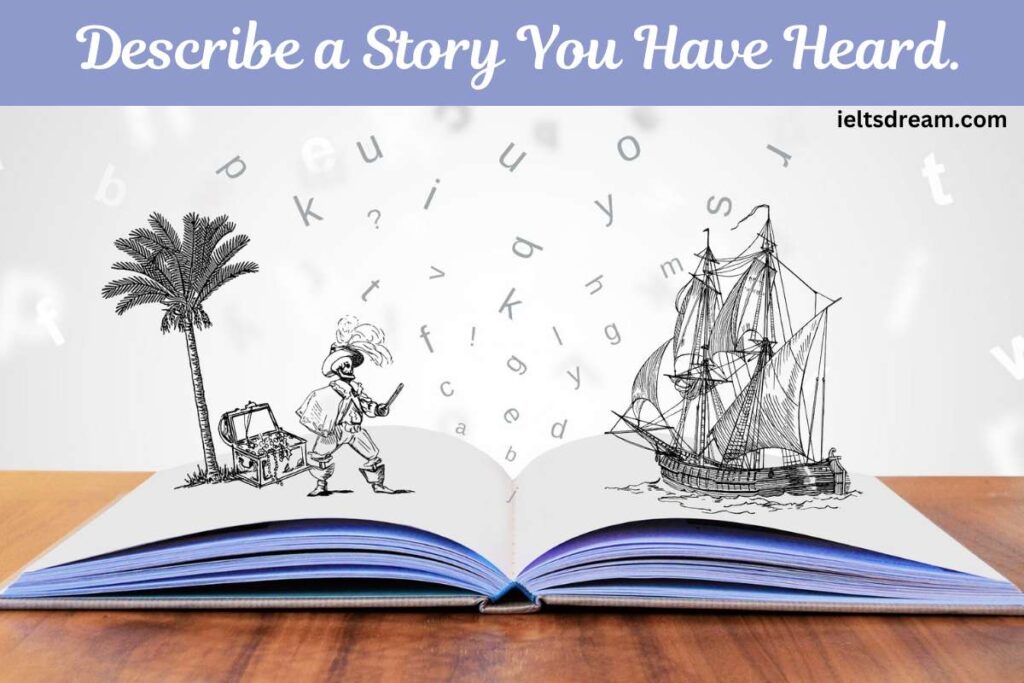Describe a story you have heard. You should say:-
Who told you this story?
When did you hear it?
What was the story about?
Why did you like this story? or Why you found it memorable?
Sample Answer: Describe a Story You Have Heard.
One of the most memorable stories I’ve ever heard was told to me by my grandmother when I was a child. I vividly remember sitting with her on a cool winter evening, sipping warm milk as she recounted this tale.
The story was about a wise and kind king who ruled a prosperous kingdom. One day, a beggar approached him with an unusual request: to fill his bowl with gold coins, but only on one condition — the bowl had to remain full once it was filled. The king agreed, only to find that the bowl seemed bottomless. Despite pouring in all the gold, it was never full. Eventually, the king learned that the bowl symbolized human greed, and he realized the importance of contentment and generosity.
I found this story deeply impactful because it carried a timeless moral. It taught me the value of gratitude and how excessive greed can lead to endless dissatisfaction. The way my grandmother narrated it, with vivid expressions and dramatic pauses, made it even more memorable. Even now, I recall the lesson whenever I face moments of discontent or ambition without purpose.
Part 3
Question 1. Has storytelling changed over a period of time?
Answer: Yes, storytelling has evolved significantly over time. Traditionally, stories were passed down orally, often accompanied by songs or gestures. Now, storytelling incorporates technology, such as podcasts, movies, and even social media platforms. These changes have made stories more visually engaging and accessible to a global audience. However, the essence of storytelling — to convey emotions and ideas — remains unchanged.
Question 2. Which way is better, traditional storytelling or the use of technology in storytelling?
Answer: Both methods have their own charm. Traditional storytelling is more personal and emotionally engaging because it allows for a direct connection between the storyteller and the listener. On the other hand, technology allows stories to reach a wider audience and includes multimedia elements like visuals and sound effects, making the experience more immersive. I believe the choice depends on the context and audience.
Question 3. Do you think that generally, most people are good at storytelling?
Answer: Not everyone is naturally good at storytelling, but it’s a skill that can be developed. A good storyteller knows how to structure a narrative, use vivid descriptions, and engage the audience emotionally. While some people have a natural flair for it, others improve through practice and experience.
Question 4. What makes storytelling effective?
Answer: Effective storytelling involves a strong narrative, relatable characters, and emotional depth. A good story should capture the audience’s attention from the beginning and hold it until the end. The use of expressive language, a clear moral or message, and the ability to adapt to the audience’s preferences also contribute to its effectiveness.
Question 5. Is it important to tell stories?
Answer: Yes, storytelling is crucial as it serves multiple purposes. It helps preserve culture, traditions, and history. Stories also educate, inspire, and entertain people. For children, storytelling aids in moral development and creativity, while for adults, it provides a way to connect and share experiences.
Question 6. Is reading books beneficial or watching documentaries better?
Answer: Both have their own benefits. Reading books enhances imagination, vocabulary, and critical thinking as readers visualize the story and interpret it in their own way. Watching documentaries, on the other hand, provides visual and factual insights, making it a more immediate and engaging experience. For me, the choice depends on whether I want to dive deeply into a subject (books) or gain quick, factual knowledge (documentaries).

